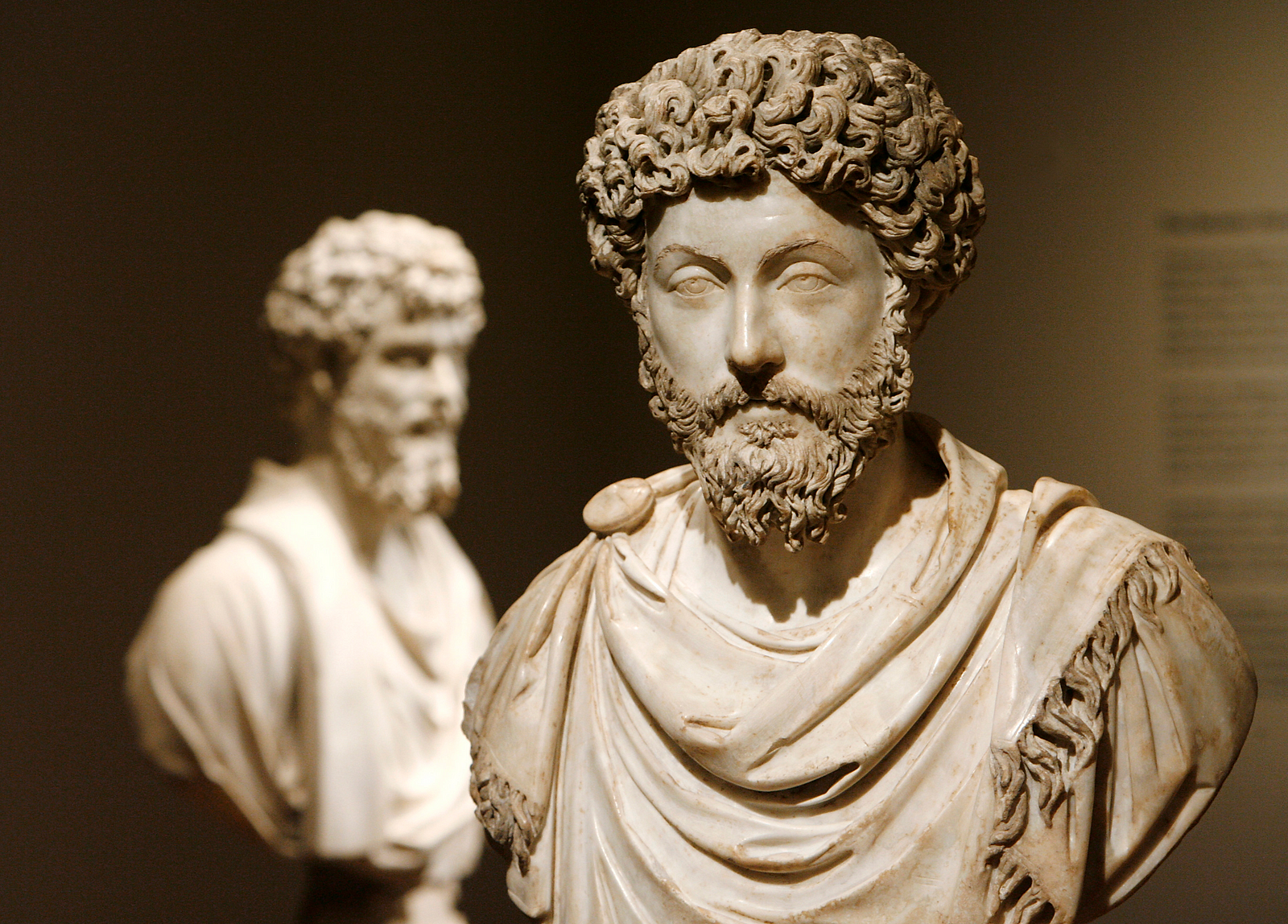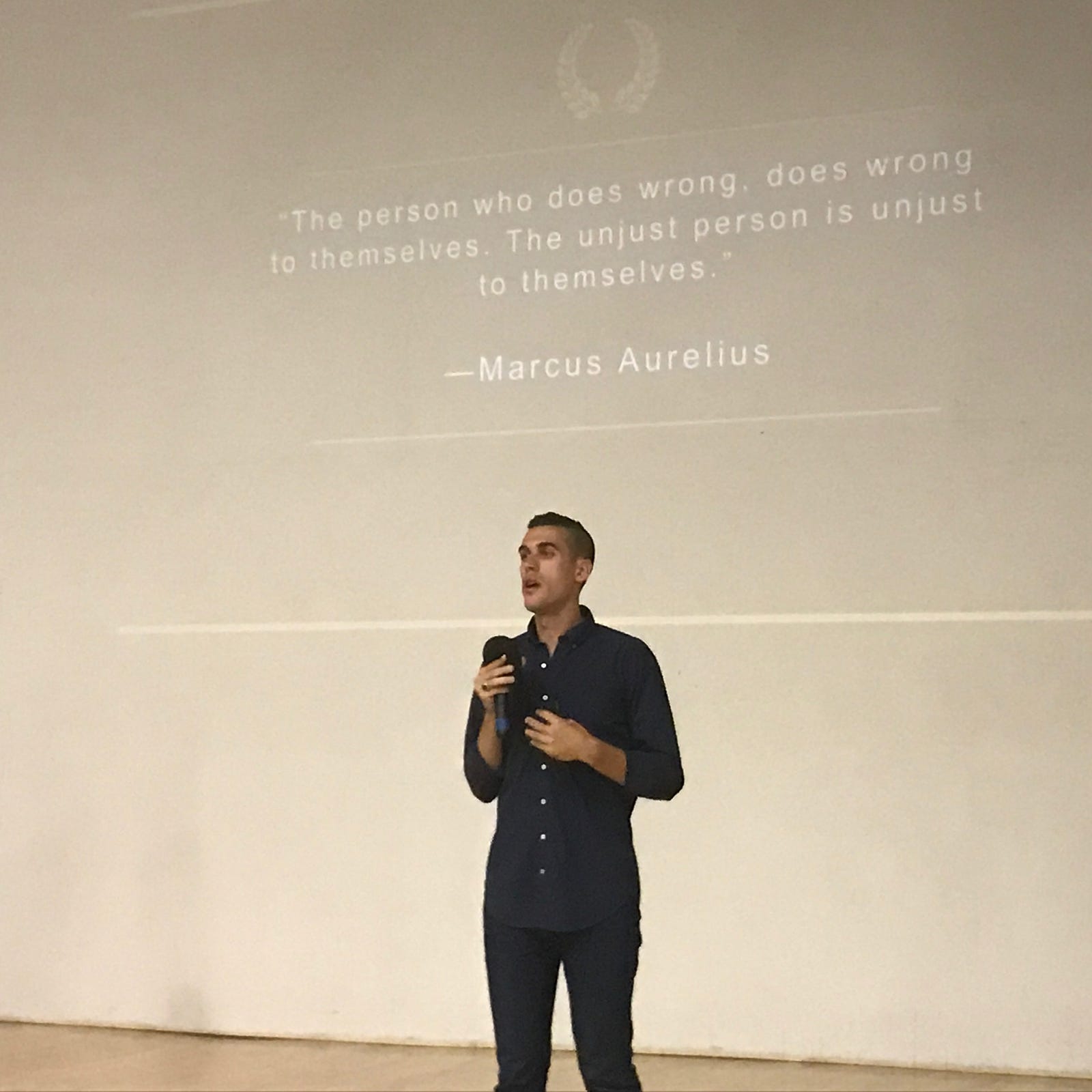An Afternoon With Ryan Holiday

Marcus Aurelius from The Daily Stoic by Ryan Holiday and Stephen Hanselman
When was the last time you thought about philosophy as a useful endeavor? If a tree falls in a forest but no one’s there to hear it, does it make a sound? This is the kind of questions that philosophy professors like to ask in class. The problem is we see philosophy as something that isn’t useful.
While the question about the tree is an important one, it also scares a lot of people away from philosophy. It is normal then that we don’t wake up craving philosophy. We don’t want to ask ourselves questions that create more questions. We want to have answers to our problems.
But we don’t have to see philosophy as something that is abstract and useless. It is only within our ignorance of the subject that we fail to appreciate its many practical benefits.
As Henry David Thoreau put it, “To be a philosopher is not merely to have subtle thoughts, nor even to found a school, but so to love wisdom as to live according to its dictates, a life of simplicity, independence, magnanimity, and trust. It is to solve some of the problems of life, not only theoretically, but practically.”
Stoicism, one branch of philosophy, is highly practical. When stoics are asked about the usefulness of philosophy, they retort with a resounding yes.
If we want to learn more about stoicism, who are some of its contemporary defenders? In other words, who can we turn to in order to get relevant answers for our contemporary problems.
At last weeks’ Stoicon, contemporary stoics gathered to discuss how stoicism is relevant today and can solve our problems. Or to quote the pamphlet, they came to “get their Stoic on!”.
Its keynote speaker Ryan Holiday, author of The Obstacle Is The Way and The Daily Stoic, co-authored with Stephen Hanselman, is one of the most popular contemporary stoics. And during his lecture Holiday reaffirmed one of the most important tenets of philosophy: its practicality.

“It stares you in the face. No role is so well suited to philosophy as the one you happen to be in right now.” — Marcus Aurelius, one of the 3 prominent Stoic philosophers
Ryan Holiday explained how Meditations by Marcus Aurelius shook everything that he understood about the world when he first read it. He showed how engaging with the original text throughout the years has improved his life. “It is a practical idea,” he said. “He is giving himself practical advice.” Holiday was referring to how Marcus Aurelius wrote the text as reminders to himself. In an article published yesterday, he writes about the 100 Things He Learned in 10 Years from engaging with the work of Marcus Aurelius.
While others often perceive Stoics as boring or negative, Holiday used them as a source of inspiration to improve and grow in his life. For example, through Stoicism he learned not to focus on the things that are outside his control. As he said of Stoicism, “It is a way to fully capture and experience life.” In other words, it is philosophy in its most practical way designed for a large audience.
To give justice to stoicism, however, in one short article is impossible. If you are curious, you have to dive into the subject matter yourself. If you google Ryan Holiday and Stoicism, you will have more than a week’s worth of great reading. To ease the transition, I list some great books below, either written by the original Stoics, or great authors who were inspired by Stoicism.
1. Marcus Aurelius’s Meditations
Few ancient works have been as influential as the Meditations of Marcus Aurelius, philosopher and emperor of Rome (A.D. 161–180). A series of spiritual exercises filled with wisdom, practical guidance, and profound understanding of human behavior, it remains one of the greatest works of spiritual and ethical reflection ever written.
Meditations (Penguin Great Ideas)
_Edit description_www.amazon.com
2. Letters from A Stoic by Seneca
For several years of his turbulent life, Seneca was the guiding hand of the Roman Empire. His inspired reasoning derived mainly from the Stoic principles, which had originally been developed some centuries earlier in Athens. This selection of Seneca’s letters shows him upholding the austere ethical ideals of Stoicism — the wisdom of the self-possessed person immune to overmastering emotions and life’s setbacks — while valuing friendship and the courage of ordinary men, and criticizing the harsh treatment of slaves and the cruelties in the gladiatorial arena. The humanity and wit revealed in Seneca’s interpretation of Stoicism is a moving and inspiring declaration of the dignity of the individual mind.
Letters from a Stoic
_Buy Letters from a Stoic on Amazon.com ✓ FREE SHIPPING on qualified orders_www.amazon.com
3. Epictetus’ Discourses
Epictetus’ Discourses have been the most widely read and influential of all writings of Stoic philosophy, from antiquity onwards. They set out the core ethical principles of Stoicism in a form designed to help people put them into practice and to use them as a basis for leading a good human life. Epictetus was a teacher, and a freed slave, whose discourses have a vivid informality, animated by anecdotes and dialogue. Forceful, direct, and challenging, their central message is that the basis of happiness is up to us, and that we all have the capacity, through sustained reflection and hard work, of achieving this goal. They still speak eloquently to modern readers seeking meaning in their own lives.
Discourses, Fragments, Handbook (Oxford Worlds Classics)
_Edit description_www.amazon.com
4. The Daily Stoic by Ryan Holiday and Stephen Hanselman
The Daily Stoic offers 366 days of Stoic insights and exercises, featuring all-new translations from the Emperor Marcus Aurelius, the playwright Seneca, or slave-turned-philosopher Epictetus, as well as lesser-known luminaries like Zeno, Cleanthes, and Musonius Rufus. Every day of the year you’ll find one of their pithy, powerful quotations, as well as historical anecdotes, provocative commentary, and a helpful glossary of Greek terms.
The Daily Stoic: 366 Meditations on Wisdom, Perseverance, and the Art of Living
_Rated 4.8/5: Buy The Daily Stoic: 366 Meditations on Wisdom, Perseverance, and the Art of Living by Ryan Holiday…_www.amazon.com
5. The Obstacle Is The Way by Ryan Holiday
Ryan Holiday shows us how some of the most successful people in history — from John D. Rockefeller to Amelia Earhart to Ulysses S. Grant to Steve Jobs — have applied stoicism to overcome difficult or even impossible situations. Their embrace of these principles ultimately mattered more than their natural intelligence, talents, or luck.
The Obstacle Is the Way: The Timeless Art of Turning Trials into Triumph
_The Obstacle Is the Way: The Timeless Art of Turning Trials into Triumph [Ryan Holiday] on Amazon.com. FREE shipping…_www.amazon.com
6. Ego Is The Enemy by Ryan Holiday
Many of us insist the main impediment to a full, successful life is the outside world. In fact, the most common enemy lies within: our ego. Early in our careers, it impedes learning and the cultivation of talent. With success, it can blind us to our faults and sow future problems. In failure, it magnifies each blow and makes recovery more difficult. At every stage, ego holds us back.
Ego Is the Enemy
_Edit description_www.amazon.com
7. Philosophy for Life And Other Dangerous Situations by Jules Evans
When philosophy rescued him from an emotional crisis, Jules Evans became fascinated by how ideas invented over two thousand years ago can help us today. He interviewed soldiers, psychologists, gangsters, astronauts, and anarchists and discovered the ways that people are using philosophy now to build better lives. Ancient philosophy has inspired modern communities — Socratic cafés, Stoic armies, Epicurean communes — and even whole nations in the quest for the good life.
Philosophy for Life and Other Dangerous Situations: Ancient Philosophy for Modern Problems
_Edit description_www.amazon.com
8. A Guide to the Good Life by William Irvine
In A Guide to the Good Life, William B. Irvine plumbs the wisdom of Stoic philosophy, one of the most popular and successful schools of thought in ancient Rome, and shows how its insight and advice are still remarkably applicable to modern lives.
A Guide to the Good Life: The Ancient Art of Stoic Joy
_A Guide to the Good Life: The Ancient Art of Stoic Joy [William B. Irvine, James Patrick Cronin] on Amazon.com. *FREE…_www.amazon.com